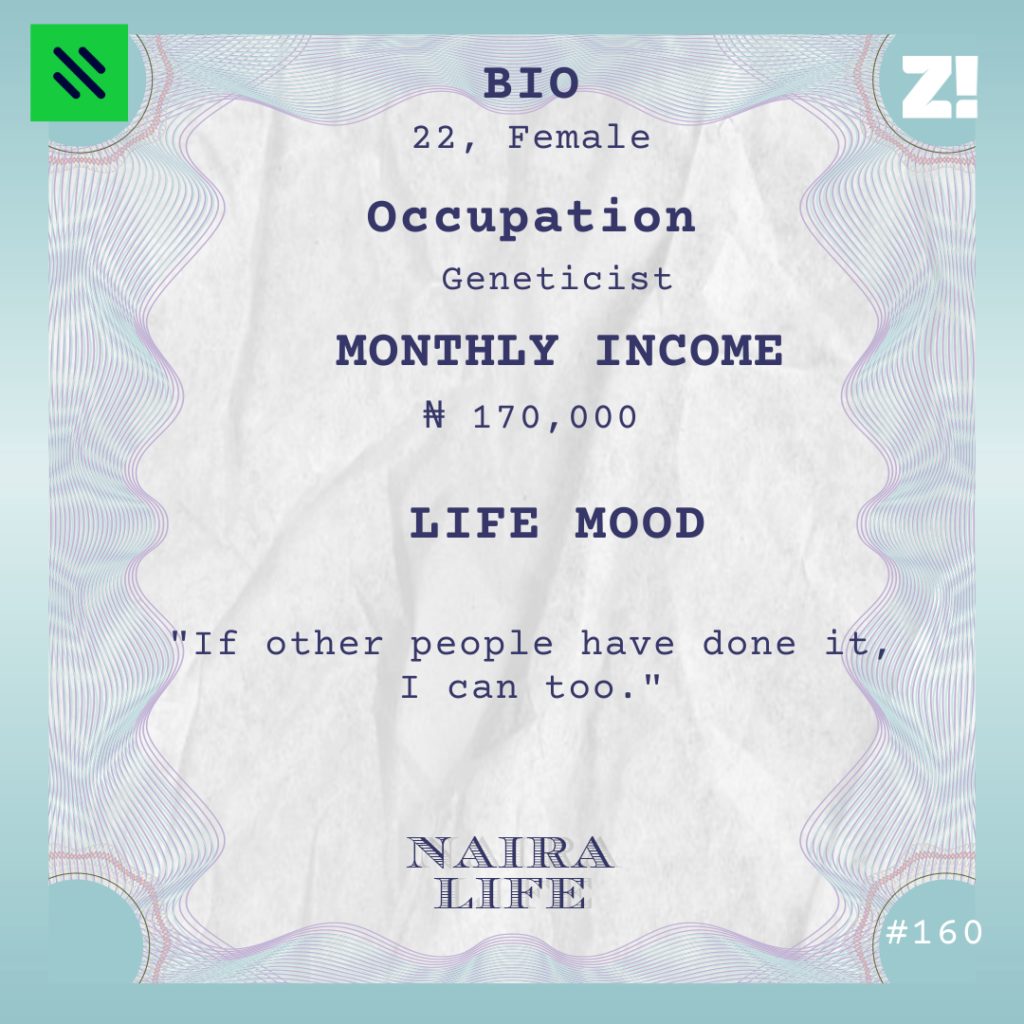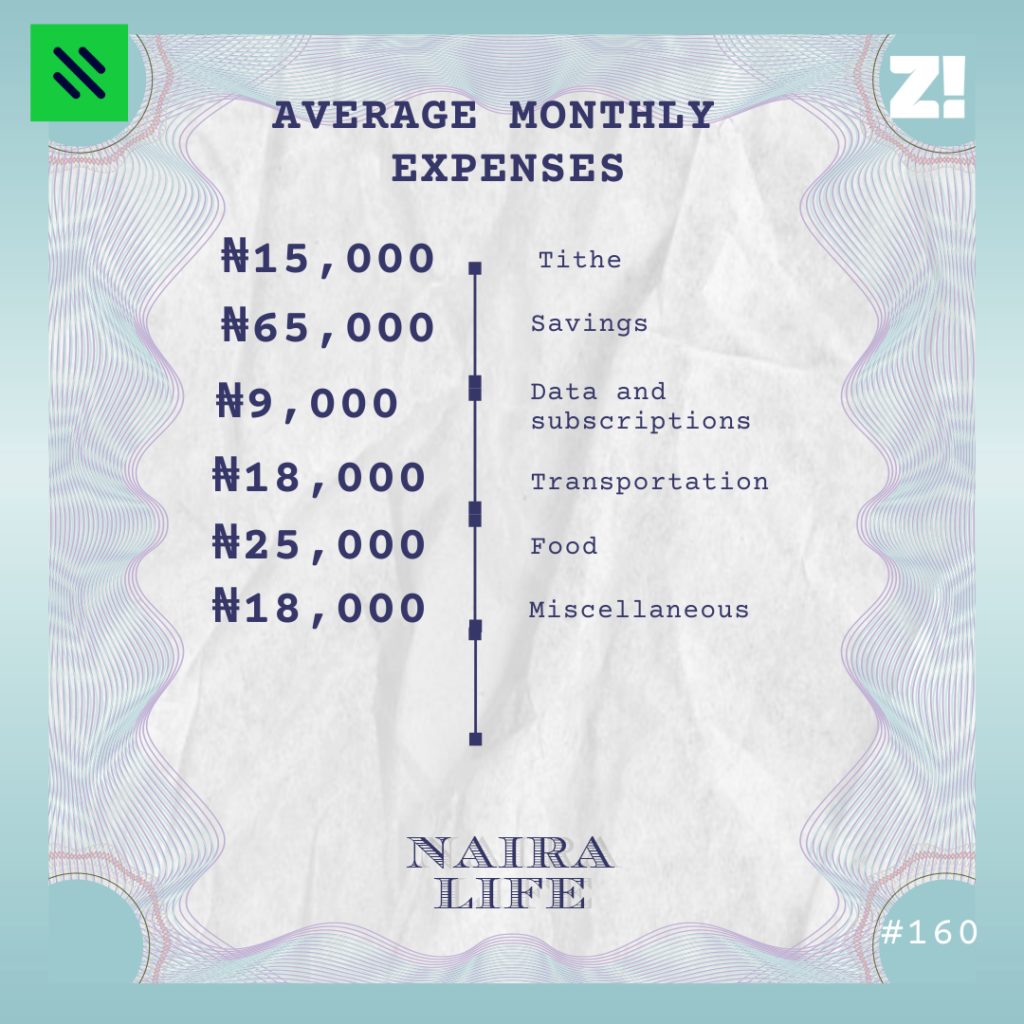Every week, Zikoko seeks to understand how people move the Naira in and out of their lives. Some stories will be struggle-ish, others will be bougie. All the time, it’ll be revealing.
This week’s Naira Life is brought to you by Busha. Thinking of starting your crypto journey and trading the most secure way? Try Busha.
Today’s subject on Naira Life started out wanting to become one of the youngest embryologists in Nigeria, then suddenly switched to genetics, but after a rough year, she’s decided to quit her job and focus on data science and becoming a chef.

Let’s start with your first memory of money.
When I was eight years old, my school had a trade fair and my mum gave me ₦3,000 to buy whatever my little sister and I wanted — ₦1,500 each. At the trade fair, I had a bright idea: I would buy stuff for my sister and me with ₦1,500, and take the other half of the money back home to my mum. ₦1,500 could buy a lot of snacks, children’s books and tiny toys in 2007, so I splurged, and then got my friends to buy me even more stuff. I even got my mum a gold-plated pen.
Back home, my mum couldn’t contain her excitement. Her eight-year-old daughter had gone out and not only made a great financial decision to save but also brought a lot of stuff home and even got her a gift. She was so proud of me. I was happy she was happy, but I was also a little confused because I didn’t realise that saving was such a big deal.
I only have memories of uncles and aunties giving me money after that incident because I remember saving those gift monies in a kolo I kept with my mum. Whenever I needed some cash to buy snacks, I asked her and she gave me. This continued until I went to secondary school and started making my own money.
What were things like at home?
I’d say we’ve always been a little above average financially. We could afford to eat well at home, get gifts, and go to restaurants occasionally. Nothing extravagant, but we weren’t suffering. My mum is a public servant and my dad is a nuclear physicist who’s always done his practice and research by himself.
Let’s talk about the money you made in secondary school.
LMAO. I went to a boarding school that didn’t allow provisions, so in SS 2, I saw an opportunity to sell drinks and snacks to hungry students in hostels after lights out. My best friend and I partnered and sold ₦100 drinks for ₦150 and added a small markup to biscuits too. During siestas, we washed and ironed clothes for people who didn’t want to do it themselves. Washing was ₦50 per piece of clothing and ironing was ₦100, but washing and ironing together cost ₦100. On an average day, we made ₦1,200 — ₦600 from drinks and another ₦600 from laundry — and split it 50/50.
But you know the painful part? Money wasn’t allowed in school because people could steal it, so we transacted in school-issued tickets. Because we couldn’t use the tickets outside school, we spent all the “money” we were making on the only thing we could — snacks. Sometimes, we had more tickets than we needed at the end of a school term, so we took them home and brought them back the next term.
In SS 3, we stopped to focus on exams, but because I had tasted what it felt like to make money, I knew I was going to continue business in university.
Did you?
Ah, yes. My monthly allowance throughout university was ₦50k — ₦20k from my dad because he thought it would be enough to survive and ₦30k from my mum because she knew I couldn’t survive on ₦20k monthly. We kept the ₦30k a secret from him.
I started looking for business opportunities after one semester in school. People were doing business left, right and centre, so I knew there was money to be made. The first thing I did was sell press-on nails. I bought a set of 24 nails for ₦2,400 and sold 10 pieces for ₦1,500, so I made about ₦600 per pack. Then I started marketing clothing items for students who wanted to sell but didn’t know how to. I took my cut on every sale.
By the time I got to my second year, I was making a steady ₦5,000 monthly from business, and spending it all, plus my allowance, on food, personal items and data. Zero savings.
In year three, I stopped selling things because school was getting stressful and pivoted into hair care. People, including me, were going crazy about natural hair and general hair care, so with my products, I helped people wash their hair, do twists, and even create regimens to follow. My monthly business income increased to ₦8,000, and the only thing that changed with my expenses was that I bought more hair products.
First nails, then hair. What did you do in final year?
Hair x100. In my final year, the school moved our hostels far away from where people usually made hair and wigs, so I expanded my hairdressing business to accommodate wig-making. For every wig I made, I charged ₦1,800. If they said it was too expensive, I broke it down for them this way: “Going to the salon will cost you ₦400 on transportation and ₦2,000 to make the wig. That’s ₦2,200. Why do you want to spend that when you can spend ₦1,800 and get it in right here in the hostel?”
It took me four hours to make a wig, and wig caps cost ₦500, so my profit on each wig was ₦1,300. I was getting about 8-10 orders a month, and between wig-making and hairdressing, I made about ₦20k a month. I think I started saving in my final year because I remember having over ₦100k when I graduated.
All this business talk is making me wonder what was happening with your studies.
I studied anatomy because I couldn’t make it into medicine, so I spent my entire university stay wondering what I would do with my life career-wise. That fear constantly put me on my feet and made me study extra hard in school so I could be in the best position to get whatever jobs came my way.
While researching one day in my final year, I stumbled on embryology. The more I read, the more amusing I found it that you could work on embryos to create new life, and the more I realised that I could make a career out of it. I did a bit more googling and saw that the fertility and IVF space isn’t so saturated in Nigeria, especially for young people, so I decided I was going to focus my career on being an embryologist.
How did that go?
Immediately I graduated in June 2019, I stopped my businesses and started going to fertility clinics to drop my resume and tell them I was willing to work for free until NYSC called me up, and then I would serve in their company for the service year. All of them rejected me. Eventually, NYSC came, I went to camp, and they posted me to a school to teach. That’s when I went to meet my parents to beg them for two things: to find someone who would hire me as an embryologist at a fertility clinic and to find someone who would help me arrange for the school I was posted to reject me.
After a month of running around and meeting a few people my parents connected me to, I was able to get both done, and I resumed as a trainee embryologist in a fertility hospital in December 2019. The pay was ₦40,000 — except from March to June 2020 when I didn’t work because of lockdown and they paid ₦16,000 — and NYSC was giving me ₦33,000. I carried my bad university spending habits into real life, so the money finished every month on data, eating out and transportation to work.
What was the job like?
I put my all into it because I had a five-year plan to become one of the youngest certified embryologists in Nigeria. Even when they needed me to come to work on Saturdays, I went. It was a lot of work, but it was work I was willing to do.
I finished NYSC in October and worked one extra month before I quit the job.
Why?
God told me to. I hadn’t taken my spirituality seriously in a while until November that year when I had the sudden urge to go to a church one Sunday morning. Shortly after I started attending the church and rekindling my relationship with God, he told me to quit my job. He didn’t say why. Two days after I heard the message, I got a job offer. It was from the child company of the hospital I worked for, and the role had nothing to do with embryology. It was a geneticist role — something I knew nothing about. The current geneticist was leaving for her PhD in two weeks, and they needed a replacement ASAP. My boss recommended me on the basis that I was a fast learner, a dedicated worker, and I’d fit into the role in no time. I took the job in mid-December 2020 and resumed fully in January 2021. The pay was ₦130,000.
Mad.
When I started earning more, I realised I needed therapy. I was struggling with anxiety, crippling fear and an addiction as a result of a recent traumatic event, and I needed to do something about it.
Care to share what happened?
Remember how in 2019 I was going up and down looking for a fertility clinic to work at and trying to get NYSC to cancel my teaching job? On one of those days, I was sexually assaulted by an NYSC official. It was through therapy I realised my extreme diligence and commitment to my job was me channelling my hurt into something. I had a six-week session with a therapist I found on Instagram. It cost ₦45,000.
I’m so sorry you went through that. How was the geneticist job going?
Difficult. My job description was to assist my boss and learn from him, but that’s not how it turned out. At the company, there were only two of us — it’s difficult to find an expert geneticist in Nigeria and people we tried to hire as expatriates were charging too much, so I wore many hats. I was the one putting on the gen, working all the excel sheets, creating presentations for my boss, maintaining records, being my boss’ PA, and still working alongside him on procedures — we work with IVF clinics to test for abnormalities in embryos.
That’s a lot.
My salary increased to ₦160,000 in June 2021, and that’s when a conversation with a friend prompted me to start saving ₦20,000 a month, paying tithe, investing in crypto and saving in dollars. The rest of my money went to transportation, data, regular eating and stress eating.
Stress eating?
In the one year I’d spent there, the job became much more tasking. I had to be at the office at 5 a.m. from time to time and would get home pretty late too.
To top it all, my boss was a tough man to work with. I couldn’t have regular conversations with him. I was so used to getting shouted at and talked down by him that my confidence had gotten low, and my self-worth was depleted. I started thinking nothing of myself because I was used to being treated like that. In the one year I had worked there, I was a totally different person. By December 2021, I realised I needed to leave.
What did you do after?
When I told him I wanted to leave in December, he tried to convince me to stay and increased my salary to ₦170,000 the next month, but I sent my resignation letter at the beginning of March 2022, and I’m leaving when the month ends. I stayed for two extra months because I want to train the person taking over from me, so they have an easier time than me.
I love it. What are your plans for the future?
Because I was doing a lot of excel work in this company where I work, I thought to myself, “Why don’t I try out data science?” When I discussed it with my friends, they encouraged me, so I recently started data science classes online. I’m excited about it because I know data is the future. Even in genetics, there’s data.
Apart from data science, I’m also looking to start a culinary career. I’ve always been a great cook, but I never thought about cooking professionally. Last month, a friend got me a job to cook for a family of six for a day’s meal, and they paid me ₦30,000. It was like scales fell off my eyes, and I saw my true earning potential in cuisine. People had been telling me that I’d make a great chef all my life and I hadn’t listened. But not anymore.
My goal is to balance both data science and cuisine and make a ton of money from them, and I’m excited about my prospects. I even got a job offer to work as an embryologist again, but this time, the pay was ₦100k. I rejected it because my eyes are on the future; I don’t want to go back.
What are your finances like right now?
I have a total of ₦723k that’s broken down into $800 saved in a finance app, ₦133k in BTC, and ₦150k in the bank.
Let’s look at your monthly expenses.

Is there an uncertainty that comes with leaving employment to try something new?
Absolutely. But I just tell myself that other people have done it, so I can too.
Is there something you want right now but can’t afford?
I want to go to Le Cordon Bleu or The Culinary Institute of America so I can become a top chef, but a more realistic alternative is a culinary school in Nigeria whose programme is ₦1.4 million. I’ll start saving towards it when I start making money again.
And your financial happiness on a scale of 1-10?
I’d say a 7 because I’ve made money at multiple points in my life and been able to afford the things I want. I have a lot more money to make and a lot more things to do, but for now, I’m satisfied.
Now that you’ve made it to the end of the article, here’s exciting news: If you want to buy and sell Bitcoin, Ethereum, and more, deposit and withdraw instantly and securely, and manage your crypto portfolio, click here to download Busha.





